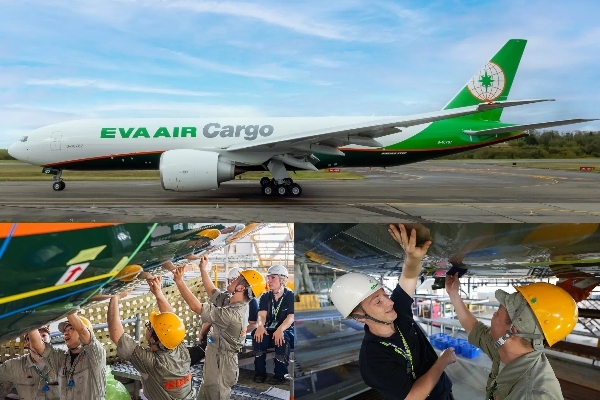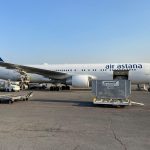EVA Air Becomes First Asian Airline to Use AeroSHARK Technology
Taiwanese airline EVA Air has become the first Asian carrier to adopt AeroSHARK technology, a drag-reducing film developed by Lufthansa Technik (LHT) and BASF. This move, announced on August 23, 2024, is part of EVA Air’s commitment to achieving net-zero carbon emissions by 2050.
AeroSHARK, modeled after sharkskin, consists of surface riblets about 50 micrometers thick, designed to reduce drag and enhance fuel efficiency. The technology will be applied to EVA Air’s fleet of nine Boeing 777 freighters. The modification process, overseen by LHT and executed by EVA Air’s affiliate Evergreen Aviation Technologies Corporation (EGAT), began with the first aircraft already undergoing the change at Taipei Taoyuan International Airport. The modified freighter is expected to return to service in early September.
Albert Liao, Executive Vice President of EVA Air’s Corporate Planning Division, stated, “We are delighted to collaborate with Lufthansa Technik in applying the fuel-saving AeroSHARK surface technology to our 777 freighters. This innovation not only reduces fuel consumption but also lowers CO2 emissions. EVA Air will continuously monitor the actual fuel-saving benefits and further evaluate additional aircraft to be equipped with this technology.”
The AeroSHARK modification is expected to reduce fuel consumption by approximately 1% per flight. For EVA Air’s nine 777Fs, this translates to an annual saving of more than 2,500 metric tons of kerosene and over 7,800 metric tons of CO2 emissions.
Dr. Wassef Ayadi, Senior Director of Customer Relations OEM & Special Engineering Services at Lufthansa Technik, commented, “EVA Air is well known for both its pioneering spirit and its technical expertise. We are proud that with AeroSHARK, we can provide international pioneers like EVA Air with a real quick-win measure to reduce the environmental footprint of their operations.”
Lufthansa Technik currently holds Supplemental Type Certificates (STCs) for AeroSHARK modifications on two types of Boeing 777. The technology is already in use on a double-digit number of aircraft globally, with plans to equip EVA Air’s entire 777 fleet by 2027. Lufthansa Technik and BASF are also working on expanding AeroSHARK’s applications to additional aircraft types and larger surface areas, with the potential to reduce CO2 emissions by up to 3% in its maximum expansion stage.














